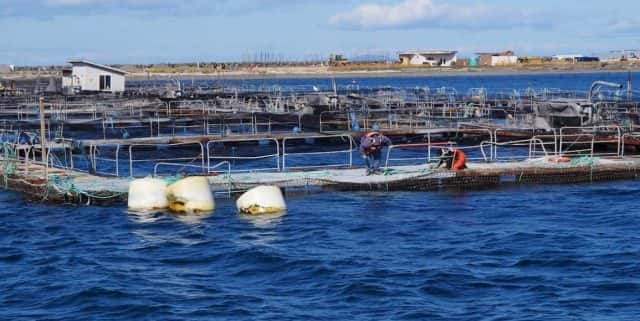
By Pepper Fisher
PORT ANGELES –The State Supreme Court unanimously ruled Thursday to uphold permits that would allow Cooke Aquaculture and the Jamestown S’Klallam Tribe to raise sterile (or triploid), female steelhead in net pens in Port Angeles Harbor. The joint venture does not yet have a lease from the Department of Natural Resources to do so.
In 2018, the Washington state Legislature phased out Cooke’s Atlantic salmon farming operations in Washington, including the one here in Port Angeles, following a spill of about 263,000 Atlantics from their pens at Cypress Island in 2017.
That led Cooke to switch to triploid steelhead, which they’ve been raising at two locations in the Puget Sound since October. Two years ago, Cooke and the Jamestown Tribe announced a 50-50 partnership called Salish Fish to open a similar facility in Port Angeles.
As CEO of Jamestown Seafood and former GM of Cooke Aquaculture Pacific, Jim Parsons says getting into steelhead aquaculture makes a lot of sense for the Tribe.
“You know, this was really something that we needed, not only for food security, but for food sovereignty. You know, that if Jamestown and some of the other tribes are going to actually be Sovereign Nations, we better have a sovereign food supply, as well. And so, it fits well with Jamestown’s aquaculture programs that we’re already doing, shellfish, and this is just the next logical step.”
Because of the issues Cooke had with its previous operations, the net pen mode of farming fish comes with a certain amount of baggage. We asked Parsons what would make the new operation better than the old one.
“The industry has changed, and it’s changed very rapidly to adopt some of the newest technologies in terms of cage design, mooring systems and, in particular, feeds and feeding systems. There’s camera and remote monitoring of how much feeds going into the pens and just, you know, more of a adaptive control over the entire system. That’s, I think, our goal at Jamestown Seafood, is just to continue to adopt the best strategies as they are developed.”
While the Supreme Court’s decision is good news for the business parties involved, they’ll still have to clear the hurdle of getting a lease approved by the DNR. That process, which will continue through the year, considers everything from tribal treaty rights to endangered-species concerns.
Parson’s sounds confident that they can have fish in brand new pens in the harbor by around this time next year, but a new fish farm in Port Angeles is certainly no sure thing.
Photo: Cooke’s previous net pen facility in Port Angeles Harbor.
